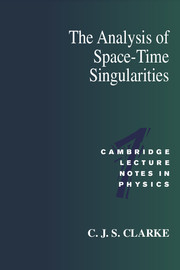3 - Boundary constructions
Published online by Cambridge University Press: 05 August 2012
Summary
In the first chapter we defined a singular space-time as one containing incomplete inextendible curves that could not be continued in any extension of the space time. We must now give the definition (at times already anticipated) of the noun “singularity”. The fundamental idea is that space-time itself (the structure (M, g)) consists entirely of regular points at which g is well behaved, while singularities belong to a set ∂M of additional points – “ideal points” – added onto M. We denote the combined set M ∪ ∂M by ClM, the closure of M, and define the topology of this set to be such that phrases like “a continuous curve in M ending at a singularity p in ∂M”, or “The limit of R as x tends to a singularity p is …” all have meanings corresponding to one's intuitive picture of what they ought to mean.
The construction can be carried out in various ways and the set of ideal points, ∂M, could contain points other than singularities. Two important classes of ideal points that are not singularities are
1. endpoints of incomplete inextendible curves that can be continued in some extension of M (such endpoints being called regular boundary points) and
2. points “at infinity” such as I+.
If the construction is carried out in such a way that ClM consists only of singularities and points of type (1) then ∂M will consist precisely of the endpoints of all incomplete curves.
Information
- Type
- Chapter
- Information
- The Analysis of Space-Time Singularities , pp. 30 - 59Publisher: Cambridge University PressPrint publication year: 1994
Accessibility standard: Unknown
Why this information is here
This section outlines the accessibility features of this content - including support for screen readers, full keyboard navigation and high-contrast display options. This may not be relevant for you.Accessibility Information
- 1
- Cited by
